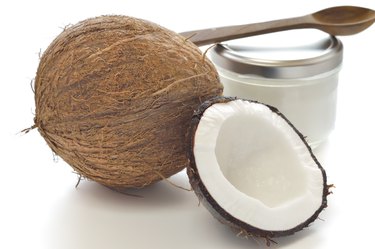
Coconut cream is a thick, rich plant-based food that comes from raw coconuts. After ripe coconuts are harvested, their white flesh is grated and soaked in water, and the cream rises to the top of the mixture for manufacturers to skim off and package. Creamed coconut is very high in calories and saturated fat, so it's best to eat it in moderation, but it does have some notable benefits.
Nutrition Facts
Video of the Day
Coconut cream differs from coconut milk in that it contains less water and more coconut, so it has a thicker, richer texture. Its ratio is 1 part water to 4 parts coconut, while the milk's ratio is 1 part water to 1 part coconut. According to the U.S. Department of Agriculture, 2 tablespoons of liquid coconut cream contains 100 calories, 1 gram of protein, 10.5 grams of fat, 2 grams of carbohydrates and 0.6 gram of fiber. About the same amount of creamed dried coconut meat, 1 ounce, has approximately 200 calories, 1.5 grams of protein, 19.5 grams of fat and 6 grams of carbohydrates.
Video of the Day
Micronutrient Content
Coconut cream has a relatively high fiber content in a small serving size, and it's also a rich source of B vitamins, vitamin C, vitamin E and the essential minerals iron, selenium, sodium, calcium, magnesium and phosphorus. B vitamins help form red blood cells and turn calories from food into usable energy; they also prevent anemia. Vitamins C and E are both antioxidants: C encourages tissue growth and repair, and E protects healthy tissues from free radical damage. Essential minerals are minerals your body can't produce on its own, and they work to encourage better immune function and disease prevention.
Fat Content
The medium-chain fatty acids in unrefined, minimally processed coconut cream and coconut oil, which are primarily lauric acids, may have benefits for health, but research on the subject has been inconclusive. According to nutritional therapist Jo Lewin, the human body is able to convert coconut's lauric acid into an antiviral and antibacterial substance called monolaurin, which works in guarding against health conditions such as skin infections, yeast infections and influenza. The fatty acids in coconut cream are also metabolized more rapidly by your liver than animal-based saturated fats, which have a different cell makeup and may be more likely to become fat stores. Unlike animal-based saturated fats, coconut cream is cholesterol-free.
The Caveats
Despite the potential health benefits of coconut cream and its lack of cholesterol, Harvard School of Public Health researchers recommend limiting it in your daily diet because of its high saturated fat content. It's also important to remember that not all coconut cream products are the same. Those that are highly processed and contain added sugar most likely have lower vitamin and mineral contents than unprocessed, unsweetened varieties. Look for products that have few additives and few total ingredients, with no sugar on their ingredient lists and with "coconut" or "coconut extract" as the first ingredient.
- BBC GoodFood: The Health Benefits of... Coconut Milk
- Food.com: Kitchen Dictionary - Coconut Milk or Cream
- USDA: National Nutrient Database
- MedlinePlus: B Vitamins
- MedlinePlus: Vitamin C
- MedlinePlus: Vitamin E
- Centers for Disease Control and Prevention: Vitamins and Minerals
- Harvard School of Public Health: Fats and Cholesterol -- Out With the Bad, In With the Good
- Ceylon Medical Journal: Coconut Fats
- Clean Cuisine: Is the Saturated Fat in Coconut Harmful?
- Journal of Drugs in Dermatology: Novel Antibacterial Activity of Monolaurin Compared With Conventional Antibiotics Against Organisms From Skin Infections
- Wellness Resources: Monolaurin -- A Natural Immune-Boosting Powerhouse